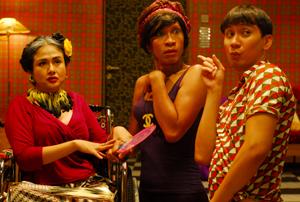
Spork offers surprising, adorkable twists on the outsider-triumphs-over-bitchy-blonde-girl-gang tale. Credit: Vancouver Queer Film Festival

I Am features the moving coming-out moments that director Sonali Gulati (left) never got to share with her own mom. Credit: Vancouver Queer Film Festival

An anonymous hookup on a return trip to campus triggers a spiritual journey of destiny, paths missed and second chances in Judas Kiss. Credit: Vancouver Queer Film Festival

From hair salon to superhero, Madame X must use her secret weapon to defend her people. Hint: think stilettos. Credit: Vancouver Queer Film Festival

"It's a place where outcasts gather and frolic and disport themselves deliciously," says the 11th International Mr Leather. Credit: Vancouver Queer Film Festival
TO FARO
What if a lie is more honest than the truth?
Erik Eide
What do you do when the person you’re supposed to be is everything that you’re not?
You lie. A lot.
It’s these lies that form the basis of the delightful mixture of honesty, laughter and romance that make To Faro so very worth seeing.
The story begins with Mel Wandel (Anjorka Strechel), a 22-year-old gender variant, meeting a new coworker named Nuno (Manuel Cortez), who has just arrived from Portugal. In a beautifully choreographed verbal dance of tension and subtlety, Nuno unwittingly gives Mel the first few strands of the web of lies that will soon be woven.
The tale quickly expands to include Mel’s overbearing family. Brother Knut and father Willi continually encourage Mel to find a husband and settle down to raise a family, as they believe any well-bred traditional woman should.
Little do they know how non-traditional Mel is about to become.
Following a harrowing near-miss car accident with Jenny and Bianca, two young girls hitchhiking to a local disco, Mel’s story takes a sudden twist. Jenny and Bianca take Mel to be a young man and ask him for a ride. Mel obliges and tells them en route that “he” is Miguel, 18 and from Portugal.
Soon the sparks begin to fly. Jenny and Mel/Miguel embark upon a whirlwind relationship that reaches its height amidst the chaos of jealous boyfriends, double lives and the untruths spewed by Mel/Miguel in the pursuit of love and acceptance.
Leaping far away from the traditional Hollywood tricks of flashy cinematography, mediocre acting and garish stunts to bamboozle viewers, this film employs simplicity and character development to deliver its tale.
Along the way, it confronts many difficult truths, including homophobia, gender-variant coming-of-age headaches, and the ethical considerations of eschewing the truth for the dream.
Writer/director Nana Neul takes a different course from most queer films with her deft handling of these often-mishandled issues. With exceeding tact and overwhelming gentleness, To Faro’s classy delivery surges far beyond the curve set by other trans-centric cinema efforts, such as Boys Don’t Cry and Transamerica, by dispensing with excessive violence and traditional binary character portrayals.
The choice is made, instead, to focus on the unique interplay of human emotion that is so often overlooked, thus saving the viewers’ nerves and highlighting the truly masterful performances delivered by the cast members, who make To Faro so special.
Strechel, Lucie Hollmann (Jenny) and Cortez all deliver inspired performances, with an uninterrupted display of talent that shows an understanding of the underlying issues faced by their characters.
Backed by a strong supporting cast, simple, non-dramatic camera work, and a subtle yet poignant musical score, this delicately crafted film offers a classic queer coming-of-age story with one big twist.
What if what you thought was just a lie is more truthful than you could have imagined?
To Faro
Opening gala Thurs, Aug 11, 7pm
Empire Granville, 855 Granville St
$11; $8 students, seniors, underemployed
(Second showing Fri, Aug 19, 5pm)
queerfilmfestival.ca
***
SPORK
Art imitating (intersex) adolescence
Greg Armstrong-Morris
Neither fork nor spoon, a spork is that hybrid utensil popular in school cafeterias. And prisons. It’s also the unfortunate nickname of this adorkable film’s adolescent hero/ine.
Spork the character (14-year-old Savannah Stehlin) is a hermaphrodite. And everybody knows it. As if high school isn’t hard enough.
Spork the film is an almost entirely successful outsider-triumphs-over-bitchy-blonde-girl-gang story. Think of an intersex Heathers but without the thumbnails-on-a-blackboard performance of Winona Ryder.
I say “almost entirely successful” only because the film needs editing. At just 86 minutes, the film isn’t too long, but writer/director JB Ghuman frequently lets us linger in scenes longer than necessary, and we get ahead of the actors.
That said, I loved it.
Spork has no lofty ambition to tell us a story we’ve never heard before. Which is fine with me. From Hamlet to Harry Potter, it’s all variations on a very few themes, anyway.
Just surprise me. Find some compelling new way to retell the tale and make me care about the people in it. Ghuman and his team succeed with queer (in every sense) abandon.
Spork’s only friend, trailer park neighbour Tootsie Roll (13-year-old Sydney Park) has a dream: to win the school dance competition and use the cash prize to visit her father in prison. But fate intervenes and Tootsie is hobbled by an unfortunate Afro-Sheen incident.
Selflessly, Spork offers to take Tootsie’s place if Tootsie will teach her how to dance like “that.” And by “that” she means “black.”
Like I said, just surprise me.
Ghuman’s design team plants us firmly in the 1980s with pastel-coloured popped collars, gravity-defying bitch-bangs and JJ Fad’s “Supersonic.” But before I could slip into a nostalgic state of Pretty in Pink bliss, the soundtrack (by Casey James and The Staypuft Kid) hit me with Cazwell’s “Ice Cream Truck” and original music by Lady Tigra. It’s an audio-visual mix that underscores (literally) the tale’s timelessness.
The performances of the mostly teenaged cast are often awkwardly self-aware. But this only adds to the film’s quirky authenticity. I mean, who wasn’t awkwardly self-aware during those awful secondary school years? It’s art imitating adolescence.
Spork
Sun, Aug 14, 7pm
Rio, 1660 E Broadway
queerfilmfestival.ca
***
I AM
Coming out through other people’s parents
Natasha Barsotti
Spotlighted by a desk lamp, Sonali Gulati sifts through photographs of herself and her mother.
“I wish I would have told you,” she says. It’s one of many quiet but poignantly stark moments in Gulati’s film I Am that allow a rare glimpse into the lives of queer Indians who take us on their variously joyful, courageous, painful and humorous coming-out journeys with their parents.
Gulati’s own coming out is incomplete, stalled in time, because she never got the chance to finish the sentence “I am” in the physical presence of her mother, who died when Gulati was 25.
In its own way, I Am is the vehicle through which she reaches out to her mother’s now silent spirit in an effectively spare, sporadic monologue. “Maybe I would have said, ‘I’m just not interested in men,’ or maybe I would have said, ‘I’m in love… in love with a woman,’” Gulati muses, testing out the words of the conversation she might have had.
I Am is also an opportunity for Gulati to vicariously experience the coming-out travails of interviewees Lesley, Balli, Nikhil, Piali, Elakshi, Aditya, Rituparna, Harpreet and, perhaps her most prominent subject, Manvendra Singh Gohil, the only known royal in modern India to reveal his homosexuality.
Yet the film’s defining moments come more often from parents’ moving testimonies of unconditional acceptance of their children’s sexuality.
“At the start of the film I didn’t realize that I wasn’t quite ready to have conversations with parents that I hadn’t had with my own mother, and I wasn’t really conscious of that,” Gulati observes. Like the conversation with the no-nonsense, progressive Gaver, Harpreet’s mom, who admits that even she wanted her son to get married.
“What is the use of forcing him to lead a life which he’s not meant to live, or which he doesn’t want to live?” she asks. “It is doomed from the beginning.
“What’s so great about being straight? There’s nothing wrong in being gay also,” Gaver adds with defiance.
“I would say I would come and meet your parent and I will try to convince her… I would have done it, if you had come to me if your mother was still alive,” she tells Gulati, who breaks down.
“I basically started crying. I couldn’t pick up the camera again for another year and a half,” Gulati tells Xtra.
Then there’s Elakshi’s mom, who at first asked Gulati to blur her features for the final cut but eventually dispensed with that camouflage and now provides the film with an enduring endnote: a placard around her neck that simply reads, “Proud Mother.”
“Seeing her go through her journey of not just participating in the film but also advocating for her daughter’s rights and doing it quite publicly, really helped me in terms of my resolution,” Gulati says. “I could finally imagine my mother’s possible journey of acceptance, because initially I thought my mother would never have accepted it. Seeing Elakshi’s mother go through her journey made me think, ‘Maybe my mother might have come round’ — just as Elakshi’s mom had come round.”
I Am
Sat, Aug 13, 7pm
Rio, 1660 E Broadway
queerfilmfestival.ca
***
JUDAS KISS
If you could have a college do-over, would you take it?
Raziel
If you could change your past to change your future, would you?
Both Charlie David and Richard Harmon, stars of the edgy and mysterious film Judas Kiss, say they wouldn’t in their personal lives.
“The good comes along with the bad, and life is about the roller coaster journey,” David says. “The sweet spots wouldn’t be as sweet if you didn’t have the downs.”
Judas Kiss emphasizes destiny, defining your own path and healing from your past. It follows the life(s) of Danny Reyes and takes place at a film school, where a provocative and cathartic student film is the key to Danny’s future.
Although David and Harmon confess they’ve never had a Judas kiss, they certainly did plenty of kissing on screen. “It was actually my first sex scene,” Harmon laughs. “It’s pretty humorous that it was a gay sex scene. But the guys I was doing it with knew exactly what a straight kid needed to feel comfortable.”
One of those guys is none other than porn superstar Brent Corrigan, aka Sean Lockhart. “I was a little skeptical,” Harmon admits about casting Lockhart.
From the opening credits, Judas Kiss wonders whether homosexuality and Christianity could be two sides of the same coin. “Well, I do think it was pretty interesting that Jesus had 12 hot guys following him around,” David muses.
I asked the Canadian College of Performing Arts graduate what advice he would give his younger self if he could go back to college the way his character does in the film. “At that point I was dating a girl,” he laughs. “So I think I would’ve said, ‘Get real, boy. There’s some really cute boys in this college. What are you waiting for?’”
A film about second chances, Judas Kiss asks just that.
Judas Kiss
Sat, Aug 13, 8pm
Edgewater Casino, 750 Pacific Blvd
Thurs, Aug 18, 9:30pm
International Village (Tinseltown),
88 W Pender St
queerfilmfestival.ca
***
MADAME X
Insatiable camp from Indonesia’s up-and-coming gay filmmaker
Raziel
Madame X is insatiable camp delivered like the cream at the end of a disco stick: surprising and in your face.
The story is fast-paced and kooky, with an array of comedic talent portraying eccentric and over-the-top characters. Its ability to move you to tears and laughter, when it’s not making you roll your eyes, suggests potential cult status in the making.
Adam is an Indonesian tranny working at a hair salon who finds out her destiny is beyond anything she could have ever imagined. An anti-gay political party is taking over, and girl better douche before she gets the shit kicked out of her.
After receiving a prophecy that changes her life, Adam embarks on a hilarious and empowering transformation from zero to superhero.
As Madame X, she must defend her people by bringing down the tyrannical party leaders. Fitting only for a gay superhero, Madame X’s secret weapon is an ancient dance, her stilettos clicking like the trigger of a gun.
Flamboyant and memorable, you’ll want to read the subtitles fast because Madame X might strike at the bat of your fake eyelashes.
Madame X
Fri, Aug 19, 7pm
Empire Granville, 855 Granville St
queerfilmfestival.ca
***
KINK CRUSADERS
Love letter from a leather weekend
Greg Armstrong-Morris
Chuck Renslow has been producing Chicago’s International Mr Leather competition since 1979, when a ruggedly good-looking oil rigger from San Francisco beat 11 other contestants to win the first title.
In 2008, filmmaker Michael Skiff documented the competition’s 30th anniversary, where the 51 participants from six countries included differently abled daddies, sons of all ages, bootblacks of colour and even a couple of straight guys.
Kink Crusaders is a love letter from that weekend, and Skiff makes no bones about his respect and admiration for this community.
“It’s a place where outcasts gather and frolic and disport themselves deliciously,” grins Guy Baldwin who, in 1989, became the 11th International Mr Leather.
Skiff provides vintage footage of Baldwin in his title-winning glory — a towering Tom of Finland model come to life.
Twenty-two years later, Baldwin, now an author, activist and psychotherapist, is a devoted mentor to the latest gathering of hopefuls. “I invite them to see their time here as precious and unusual. I try to accomplish what I always try to accomplish: transformation.”
From their early AIDS fundraising efforts to their ongoing fight with the American Psychiatric Association — challenging the archaic diagnosis of kink as illness — Skiff captures a community with a legacy and a relevance that reaches beyond the scope of kinky play.
Kink Crusaders
Sat, Aug 20, 6:30pm
Empire Granville, 855 Granville St
queerfilmfestival.ca


 Why you can trust Xtra
Why you can trust Xtra


